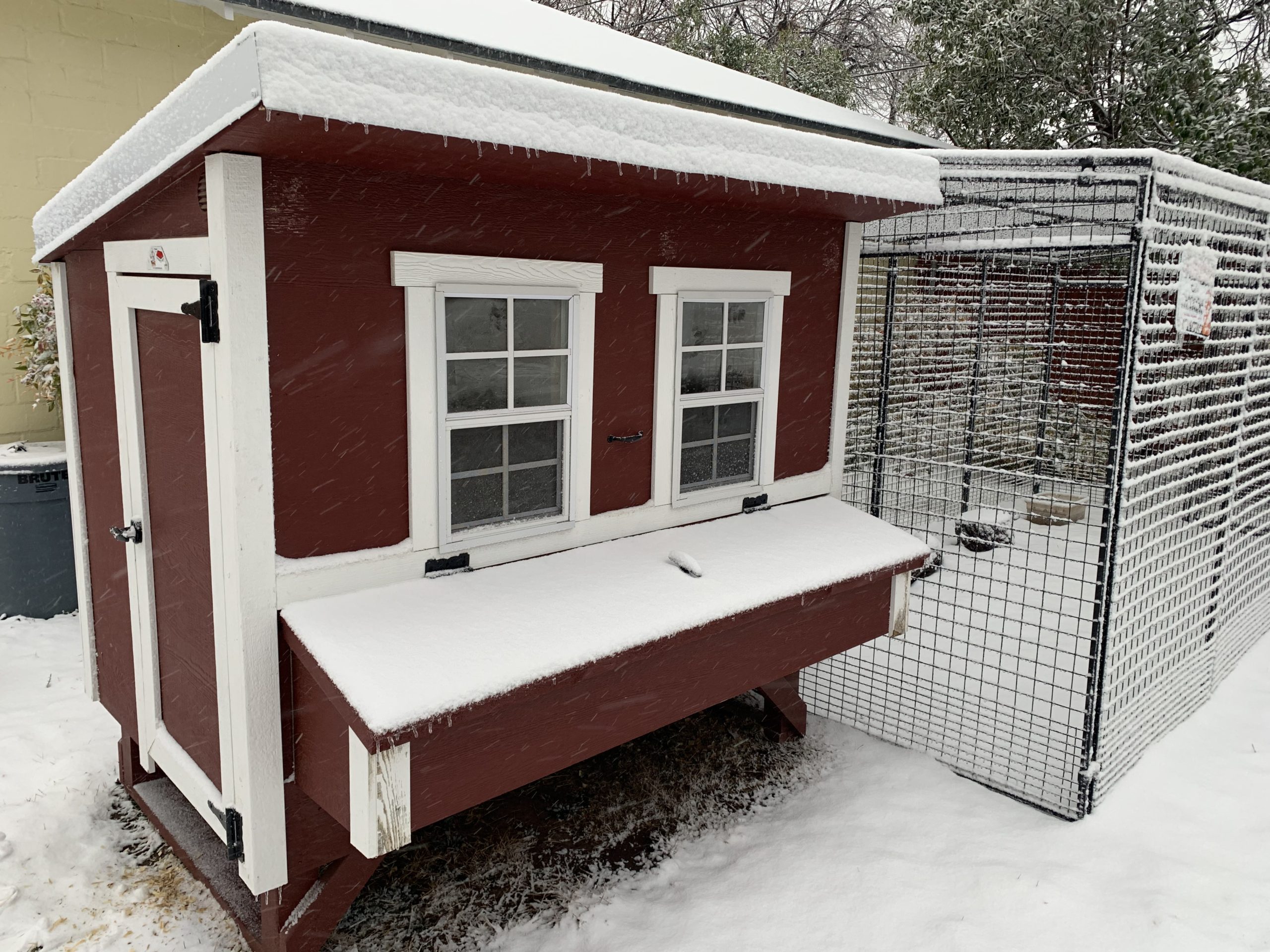This is a common question among beginner chicken keepers. In fact, it was something that we had to learn about the hard way (I’ll share more on that later).
In most cases, supplement heat is not required for a chicken coop. Chickens are able to tolerate cold weather much better than hot weather. In addition, heating a chicken coop can be a fire danger or cause health issues for your chicken by causing them to overheat.
In this article, I will explain the health issues that can arise with your chickens in cold weather and the best ways to keep them safely warm and comfortable during the winter.
Health Concerns with Chickens in Cold Weather
By their nature, chickens are able to withstand bitterly cold temperatures much easier than they can tolerate high heat and humidity.
When there are extremely low temperatures, wind, ice, and snow, your chickens can experience health issues due to these environmental factors.
The main health concern of chickens during the winter is frostbite. Frostbite is caused by bitterly cold wind and can occur on a chicken’s comb, wattles, or toes.
During the winter, the comb in particular is subject to frostbite. This is because chickens will sleep with their heads tucked under a wing and if the comb is not fully covered by the wing it can get frostbite.
Certain breeds of chickens, like Leghorns, Minorcas, and Anconas have extra-large combs. These large combs allow them to tolerate heat much better than breeds with small or pea combs.
Large combs are more prone to frostbite or injury so watch out for this if you have any of these breeds of chickens.
Petroleum jelly can be added to the comb during winter to help prevent frostbite. It can also treat frostbite if it has already occurred.
In addition to frostbite, chickens can suffer from dehydration during below freezing weather due to a frozen water supply.
Pay particular attention to your chickens’ water supply as the temperatures drop below freezing and make sure that it does not freeze over.
There are many types of heated waterers for chickens. If you live in a climate that regularly gets below freezing during the winter, it might be a wise investment to buy a heated waterer before the temperature drops.
How to Safely Keep Your Chickens Warm in Cold Weather
A major concern of heating your chicken coop during the winter is due to fire danger. Heat lamps, faulty extension cords, and overheated excess dust can all contribute to a potential fire in your coop.
There are several ways that you can safely and naturally keep your chickens warm in cold weather.
1. Close Coop Windows (Make Sure to Leave a Crack)
In most climates, you can probably get away with leaving your coop windows open year-round.
If you feel that your chickens might get too cold, you can close the windows while making sure to leave a crack to allow for ventilation.
But won’t the chickens get cold if you have the windows open during the winter? Probably not.
Chickens handle cold much better than heat. An adult chicken’s internal body temperature is around 106 degrees F. This means it requires a lower temperature outside for them to start feeling cold.
You need to protect your chickens from drafts, which can lead to frostbite on their combs, wattles, and toes, but they still require ventilation. (Check out this more detailed article on ventilation here.)
When chickens are fully grown, their feathers provide them warmth when they are fluffed up.
Chickens will snuggle with each other to maintain warmth when they are cold. Chickens will conserve body heat when standing by standing on one leg, reducing the area of their body that is exposed to the cold.
We experienced one of the coldest winters in Texas when our chickens were about 6 months old. The temperatures were between 5 to 15 degrees F for 3 days straight and it snowed several inches.
This was extreme winter weather for where we live…however, I know of many chicken keepers that experience MUCH colder than this.
We thought there was too much snow for our chickens to be in their run so we kept them in their coop, along with their water and feed. Being totally ignorant we also had a heat lamp in their coop with the windows closed. There was condensation on their windows, which was a giant clue that they needed more ventilation!
If there is condensation on the windows, that means there’s too much moisture in the air and your chickens are at risk of getting sick.
If there is a bitterly cold wind, the windows should be mostly closed, leaving only enough of a crack to allow for ventilation inside the coop.
If the windows inside the coop are fogged up, they don’t have enough ventilation.
2. Add Extra Bedding
During the winter, you can add extra bedding to the chicken coop to provide insulation from the cold.
An extra few inches of bedding added to the floor of your chicken coop will help to keep your chickens warm while they are laying eggs or sleeping on the roosts at night.
Typically, we aim to have 3 to 4 inches of bedding inside our coop, especially during the winter.
Chickens will poop on the bedding when they are roosting at night and this manure will also help to warm your chicken coop.
It doesn’t really matter what type of bedding material you use for your coop, as long as you provide plenty of bedding which helps to insulate the coop.
For more on bedding, check out the 7 Types of Bedding for Chicken Coops.
3. Add Straw to Run
When temperatures drop below freezing, some chickens will not like to walk directly on the snow. (Of course, this is not a hard and fast rule…some chickens don’t mind the snow between their toes.)
To help keep your chickens warm and comfortable, you can scatter straw on the floor of your run. This way the chickens are not walking directly on the snow or ice.
Some people use straw for their coop bedding so you can also use this for your run during the winter.
4. Feed Scratch Grains
I like to feed my chickens scratch grains from cracked corn in the late afternoons during the winter.
The cracked corn requires more energy to digest than their feed. Because of this, it will heat up their bodies and cause them to get warmer.
I give the scratch to my chickens in the late afternoon because this is when chickens will naturally go on a foraging frenzy. They are bulking up on food before going to roost, which is when they will digest their food through the night.
Since the scratch grains will warm up my chickens, I don’t offer them this treat during the summer (I instead give them sunflower seeds).
5. Check Water Supply
As mentioned previously, chickens are at risk of dehydration during the winter due to frozen water supplies.
Even when it’s cold outside, chicken still need to drink.
In general, an adult chicken will require 1 to 2 pints of water daily. Even during the winter, chickens will drink at least this amount.
Water is necessary for chickens to digest food, moderate their internal temperature, grow feathers, and lay eggs. Eggs are made of between 70 to 80% water!
Check for signs of dehydration in your chickens during the winter. Signs of dehydration can include:
- Lethargy
- Panting
- Diarrhea
- Paleness of the face
If you are not able to provide fresh, thawed water to your chickens throughout the day (either because of work, caring for kids, etc.), then you might consider getting a heated waterer.
You could also use a rubber pan for their water instead of a metal pan. When the water freezes over in a rubber pan, some people find it easier to dump out than a metal pan.
In summary, chickens are able to tolerate cold weather much better than they can handle hot weather.
Heating a chicken coop is not necessary, unless you live in a bitterly cold climate. Adding heat can be dangerous because it can be a fire hazard and can also get the coop too hot for your chickens.
Make sure your coop has proper ventilation at all times of the year, including during cold weather. If the windows are fogged up, there is not enough ventilation.
Always make sure your chickens have access to fresh water.


